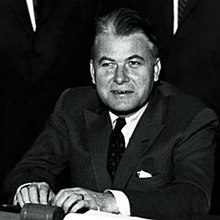Bert T. Combs
| Bert T. Combs | |
|---|---|

Combs in 1960
|
|
| Judge of the Sixth Circuit Court of Appeals | |
|
In office April 5, 1967 – June 5, 1970 |
|
| Nominated by | Lyndon B. Johnson |
| Preceded by | Shackelford Miller, Jr. |
| Succeeded by | W. Wallace Kent |
| 50th Governor of Kentucky | |
|
In office December 8, 1959 – December 10, 1963 |
|
| Lieutenant | Wilson W. Wyatt |
| Preceded by | A. B. "Happy" Chandler |
| Succeeded by | Edward T. Breathitt |
| Personal details | |
| Born |
Bertram Thomas Combs August 13, 1911 Manchester, Kentucky |
| Died | December 4, 1991 (aged 80) Powell County, Kentucky |
| Resting place | Beech Creek Cemetery Manchester, Kentucky |
| Political party | Democratic |
| Spouse(s) |
Mabel Hall (m. 1937–69) Helen Clark Rechtin (m. 1969–86) Sara Walter (m. 1988–91) |
| Alma mater | University of Kentucky |
| Profession | Lawyer |
| Religion | Baptist |
| Awards |
Bronze Star Medal Military Merit Medal of Philippines |
| Military service | |
| Allegiance |
|
| Service/branch |
|
| Years of service | 1943–1946 |
| Rank | Captain |
| Battles/wars | World War II |
Bertram "Bert" Thomas Combs (August 13, 1911 – December 4, 1991) was a jurist and politician from the U.S. state of Kentucky. After serving on the Kentucky Court of Appeals, he was elected the 50th Governor of Kentucky in 1959 on his second run for the office. Following his gubernatorial term, he was appointed to the Sixth Circuit Court of Appeals by President Lyndon B. Johnson, serving from 1967 to 1970.
Combs rose from poverty in his native Clay County, Kentucky, to obtain a law degree from the University of Kentucky and open a law practice in Prestonsburg. He was decorated for prosecuting Japanese war criminals before military tribunals during World War II, then returned to Kentucky and his law practice. In 1951, Governor Lawrence Wetherby appointed him to fill a vacancy on the Kentucky Court of Appeals. Later that year, he was elected to a full term on the court, defeating former governor and judge Simeon S. Willis. Kentucky's Democratic Party had split into two factions by 1955 when Earle C. Clements, the leader of one faction, chose Combs to challenge A. B. "Happy" Chandler, who headed the other, in the upcoming gubernatorial primary. Combs' uninspiring speeches and candidness about the need for more state revenue cost him the primary election. Chandler, who went on to win the governorship, had promised that he would not need to raise taxes to meet the state's financial obligations, but, ultimately, he did so. This damaged Chandler's credibility and left Combs looking courageous and honest in the eyes of the electorate. Consequently, in 1959, Combs was elected governor, defeating Harry Lee Waterfield, Chandler's choice to succeed him in office, in the primary. Early in his term, Combs secured passage of a three percent sales tax to pay a bonus to the state's military veterans. Knowing a tax of one percent would have been sufficient, he used the excess revenue to enact a system of reforms including expansion of the state's highway and state park systems. He also devoted much of the surplus to education.
...
Wikipedia
